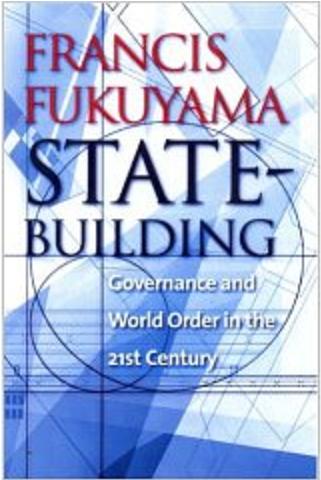State Building: Governance and World Order in the Twenty-First Century
by Francis Fukuyama
(Profile Book, 2004, 194 pages)

In recent times, there has been a trend to weaken overly powerful states, either because these states were internally tyrannical -- their scope for intervention in daily life was too great -- and/ or they were externally aggressive. More recently, and partly as a result of the collapse of communism, the opposite is occurring: some states are too weak and need to be built up. Fukuyama's book on state building, "the creation of new government institutions and the strengthening of existing ones", is concerned with the latter trend. Fukuyama argues that state-building is one of the most important issues for the world community because weak or failed states are the source of many of the world's most serious problems, including poverty, AIDS, drugs and terrorism.
Does Fukuyama have the recipe for state-building? Unfortunately, no. Nevertheless, he has some powerful insights and dishes out a gentle clip under the ear for a few "do-gooders".
When the "coalition of the willing" decides to invade Afghanistan or Iraq, or multilateral agencies decide to assist in sub-Saharan Africa, what can they transfer that will stick? After all, the number of nations that have prospered after the withdrawal of foreign advice and support are exceedingly few: arguably, the British in India, Singapore and Hong Kong. The US has occupied variously Cuba, Haiti, the Dominican Republic, Mexico, Panama, the Philippines and South Korea, but only the latter two have achieved long-term economic growth.
With such a record, the international financial institutions, international donors, and NGOs have to be cautious in raising expectations about the long-term effectiveness of "capacity building". More importantly, they have to ensure that they do not destroy institutional capacity in the developing countries. Fukuyama argues that almost every African country had better institutional capacity at independence than they possess today. One reason is that the more services are provided by outsiders, the more the local capacity to provide withers. We see this phenomenon in our own Aboriginal communities. It appears that the donor has to make a choice between delivering services, drugs, food and so on, or delivering services to the local responsible authorities to enable them to work with their consumers to deliver the services. In short, NGOs' taking over the delivery of government service (even corrupt ones) destroys government capacity.
In a detailed discussion of organisation theory and public administration, Fukuyama concludes that "there are no optimal organisations", which leaves the business of transferring knowledge about capacity-building in a bit of a pickle. There are some activities, such as central banking, where technocrats, involved in a small number of highly specific decisions can make a great deal of difference. Flying in "10 bright bureaucrats" can help. The same cannot be said for activities where a very large number of decisions of relatively small consequence have to be made, such as the law and education. These are the most difficult areas to import ideas and designs for public administration. For example, the elimination of patronage and corruption in the public service is a basic goal, but there are many ways to achieve it.
There is a delightful précis of the difference between Europe and the US on the question of when to intervene. Fukuyama follows Robert Kagan's explanation, that Europeans believe that they are living at the end of history, in a largely peaceful world governed by international law where Realpolitik has become obsolete. Americans believe that they are still living in history and need to deal with traditional power politics to tackle threats. The "Europeans are half right", they have created an end-of-history world for themselves within the EU, but it is ultimately guaranteed by American military power!
The book needs to be more adventurous and speculative about what may work, and what will not. He mentions William Easterly's observations of the follies of World Bank/ IMF debt forgiveness and the dangers of poor incentives (March 2003), and de Soto's marvellous insights on the need for secure property rights. Beyond that, his unique observations may be that the problem is not solvable without real power to intervene, but that over-enthusiastic transfer of Western norms may do more harm than good.
No comments:
Post a Comment